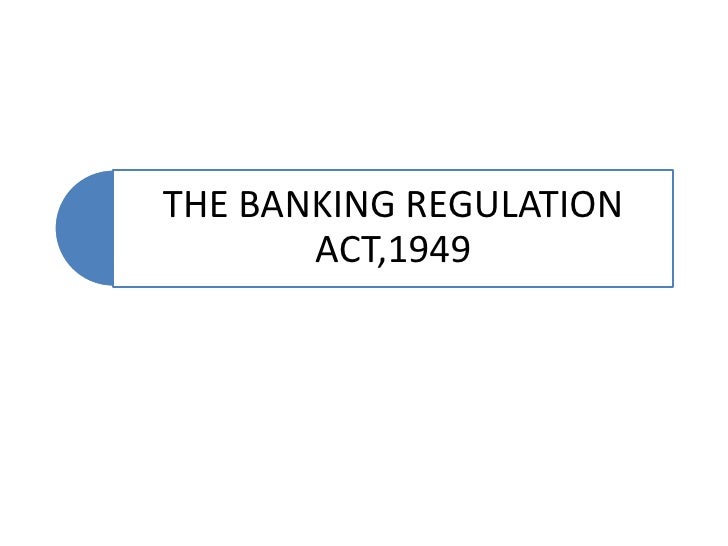The Banking Regulation Act, 1949 is a legislation in India that regulates all banking firms in India passed as the Banking Companies Act 1949, it came into force from 16 March 1949 and changed to Banking Regulation Act 1949 from 1 March 1966. Initially, the law was applicable only to banking companies. But, 1965 it was amended to make it applicable to cooperative banks and to introduce other changes.
In 2020 it was amended to bring the cooperative banks under the supervision of the Reserve Bank of India.
Overview
The Act provides a framework under which commercial banking in India is supervised and regulated. The Act supplements the Companies Act, 1956 Primary Agricultural Credit Society and cooperative land mortgage banks are excluded from the Act
The Act gives the Reserve Bank of India (RBI) the power to license banks, have regulation over shareholding and voting rights of shareholders; supervise the appointment of the boards and management; regulate the operations of banks; lay down instructions for audits; control moratorium, mergers and liquidation; issue directives in the interests of public good and on banking policy, and impose penalties
In 1965, the Act was amended to include cooperative banks under its purview by adding the Section 56. Cooperative banks, which operate only in one state, are formed and run by the state government. But, RBI controls the licensing and regulates the business operations. The Banking Act was a supplement to the previous acts related to banking.
(b) "banking" means the accepting, for the purpose of lending or investment, of deposits of money from the public, repayable on demand or otherwise, and withdrawal by cheque, draft, order or other wise;
(c) "banking company" means any company which transacts the business of banking1 [in India]; Explanation.--Any company which is engaged in the manufacture of goods or carries on any trade and which accepts deposits of money from the public merely for the purpose of financing its business as such manufacturer or trader shall not be deemed to transact the business of banking within the meaning of this clause;
Important Provisions:
Business allowed for a banking company (Section 6)
• Lending/Borrowing of money with/ without security, issuing travellers’ cheque, buying & selling foreign exchange notes, deposits vaults, collecting & transmitting of money & securities, buying bonds and other securities on the behalf of customers.
• Transacting and carrying on every kind of guarantee & indemnity business.
• Selling, managing & realizing any property which comes in possession of the bank in procedure of settlements of claims.
• Executing and undertaking of trusts
• Other works which are advancements of main purpose of the company or incidental
• A form of business that is defined by the Central Government in its issued notification
Prohibition on trading (Section 8)
A banking company cannot get in directly or indirectly contracts in buying or selling or exchange of goods.
Disposal of Non Banking assets (Section 9)
Banks cannot hold any property for more than 7 years for the purpose of settlements of debts or obligations. Such time limit of 7 years can be augmented by the Reserve Bank of India for another 5 years, if it thinks appropriate.
Reserve fund (section 17)
Every banking company must generate a reserve fund out of its earnings after tax and interest. Such reserve amount should be at any rate 20 percent of such profits. Exemption can be provided only if the cumulative amount of reserve fund & securities premium is greater than the paid up capital of the company.
Cash reserve (Section 18)
Atleast 3 percent of the total demand & time liabilities should be kept as cash reserve or should be secured in current account with Reserve Bank of India. Liabilities will not comprise monies received from Reserve Bank of India/ EXIM bank/ Development bank or any such other bank. Such amount should be deposited/ kept on last Friday of every 2nd fortnight of every month. The return should be deposited before twentieth day of every month stating the particulars of amount deposited to Reserve Bank of India.
Accounts & balance sheet (Section 29)
Banking companies should plan balance sheet and profit & loss account on last working day of every accounting year in the forms set out in third schedule. Accounts must be signed by atleast three directors where number of directors exceeds three. If number of directors’ fall short of three, then all directors must sign the accounts. In case of banking company incorporated outside the nation, accounts must be signed by principal officer or manager of the company in India.
Auditing of Banking Company (section 30)
• Balance sheet and Profit & Loss made compliant with section 29 must be audited by a person qualified under law to discharge his duties as an auditor
• The banking company must obtain the approval of Reserve Bank of India before removing/ appointing and re - appointment of auditors.
• When Reserve Bank of India is not satisfied with financial statements of the bank, it can give order for carrying out a special audit. And cost of such special audit must be put up by the banking company itself.
• The liabilities, powers and scope of the auditor are same as given in section 227 of companies act 1956.

Comments
Post a Comment